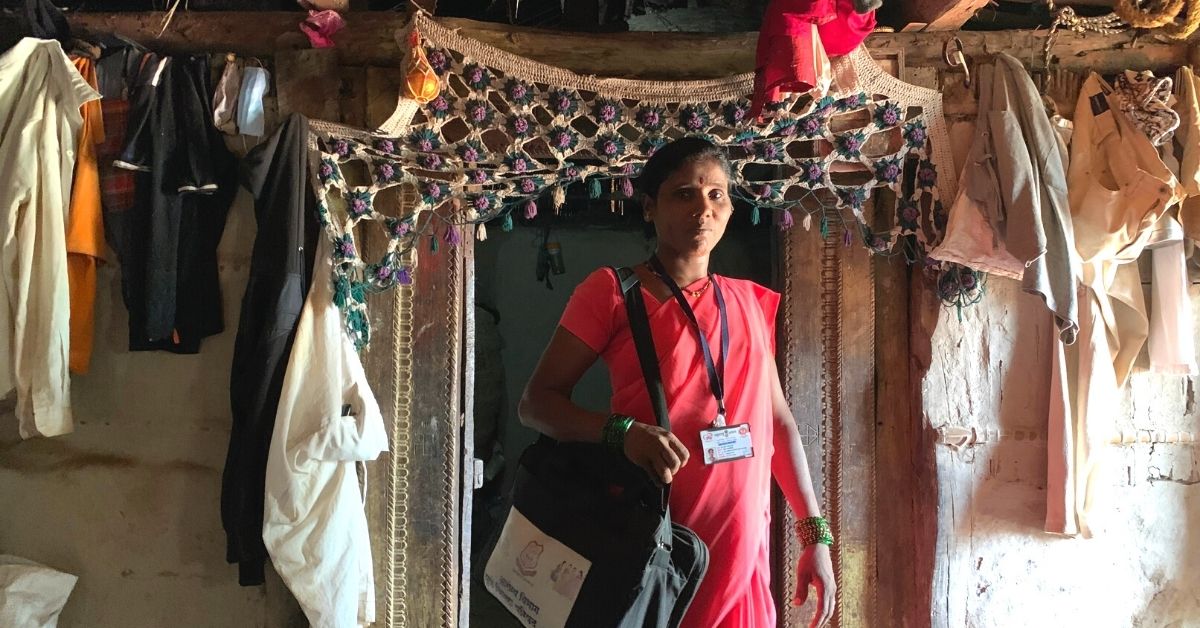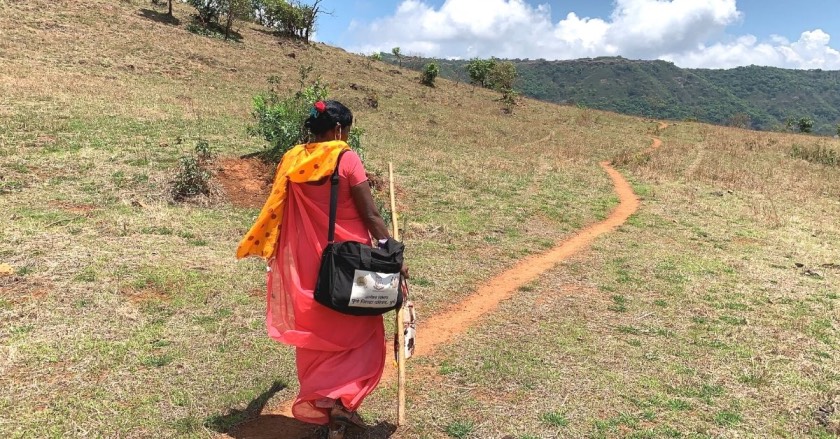In July 2020, two villagers from a nomadic tribe in remote Mangaon from the Pune district of Maharashtra were diagnosed with COVID-19. A few days after recovery, they moved away from their location.
The incident became concerning for Suman Dhebe, an Accredited Social Health Activist (ASHA) health worker of Zilla Parishad, who had to find them for contact tracing.
As a part of the State Government’s door-to-door screening campaign, Maajhe Kutumb Maajhi Javabdari (My family, my responsibility) aimed to trace and identify potential carriers of COVID-19 and prevent the infection from spreading.
She learned about the new location of the infected from other villagers and climbed two mountains to find them.
Her dedication and sincerity were noticed by the senior Zilla Parishad officials, who applauded her efforts. Her devotion towards her work ensured that all the five villages, with a collective population of around 1,000, remained COVID free throughout the second wave.
But for the 42-year-old, she says accomplishing this feat is just “a part” of her job.
‘Climbing Mountains is Better Than COVID Scare’

For the past year, the resident of Pole village, starts her day at 8 am and treks 12-13 km to reach one of the other four villages assigned to her — Mangaon, Shirkoli, Thangaon and Ghodshet.
Her only companion is a bamboo stick to support her on complicated terrains. An occasional breeze blowing between mountains offers her a quick respite. “It is my job and I have accepted it as my responsibility to fulfil it with complete dedication,” she tells The Better India.
The health worker has been working since 2012 and is among 48 others in the Velhe taluka, caring for pregnant women, newborns and new mothers, mapping their health and ensuring their deliveries in government facilities.
Ayush Prasad, Chief Executive Officer (CEO) at Zilla Parishad, Pune, says, “There is one ASHA worker assigned for a population of 1,000. There are only population limits but no geographic lines defined while assigning the work.”
He adds that Suman’s taluka falls in the Western Ghats near the famous Rajgad and Torna fort. “Though most of the villages are motorable, there are settlements and habitations that require hours of trekking. And Suman has ensured reaching all of the remote places without cutting corners,” he explains.
Finding people and contact tracing, Ayush adds, becomes difficult when the population is spread widely between mountains.
But Suman says that her physically demanding job of climbing mountains is preferable to the COVID-19 scare. “I have always walked for 10 hours a day, reaching out to people in need. But when the pandemic hit, I felt scared. I left my house without worry. I feared for my family after returning home, and used to wonder what would happen if I contracted the disease today?” she adds.
Suman says she does not wear any protective gear and occasionally carries a sanitiser bottle while on the job. “I cannot wear a PPE kit and trek for hours. It would be unfeasible during the rains and poor weather conditions. I had to fight all the odds and ensure that every house was screened for COVID symptoms and conducted monthly health check-ups,” she adds.
Asked about her motivation and willingness to undertake a treacherous journey every day, she says, “I am the only person who can reach out to the villagers and help in case they contract COVID-19. They are a part of my community. I cannot be careless about their health and abandon them. Moreover, with less medical infrastructure, timely help will only save us in case of infection.”
Suman says that sometimes she feels lucky that there were no COVID-19 cases reported in the five villages. “I used to explain to people about following COVID-19 protocols, wearing a mask and washing their hands regularly. But once I left for the day, there was no one to monitor them. I only hoped that the villagers would listen to my instructions,” he adds.
A Social Commitment
Ayush credits the success of the COVID-free villages to Suman’s hard work. “During the second wave, the majority of the fines for violating the norms such as not wearing a mask or violating social distancing rules were collected from rural areas. Many migrants had returned home. Moreover, there are farmhouses and other settlements in far-off areas making the villagers vulnerable to infection from outsiders,” he shares.
He says that the rural population also suffer from comorbidities like blood pressure and diabetes. “Timely administration of medicine to control health parameters becomes important in such cases and cannot be achieved without regular visits. ASHA workers earn Rs 56,000 to Rs 60,000 per year. So, money is not the motivation here but pure social commitment. By guaranteeing 100% COVID-free villages, Suman has served as the best example on following COVID-19 appropriate behaviour,” he adds.
Ayush says to ease her physical challenges, the administration is putting efforts to provide her with a two-wheeler at affordable loans. “We are trying to use Corporate Social Responsibility (CSR) funds to subsidise vehicular costs and provide some funds to her,” he adds.
But Suman says she is committed to performing her duty regardless of any help or support. “I signed up for the duty and agreed to perform all the responsibilities irrespective of the work conditions and risks. I have no complaints and will continue to perform until my age and health supports me,” she says.
Edited by Yoshita Rao
If you found our stories insightful, informative, or even just enjoyable, we invite you to consider making a voluntary payment to support the work we do at The Better India. Your contribution helps us continue producing quality content that educates, inspires, and drives positive change.
Choose one of the payment options below for your contribution-
By paying for the stories you value, you directly contribute to sustaining our efforts focused on making a difference in the world. Together, let's ensure that impactful stories continue to be told and shared, enriching lives and communities alike.
Thank you for your support. Here are some frequently asked questions you might find helpful to know why you are contributing?

